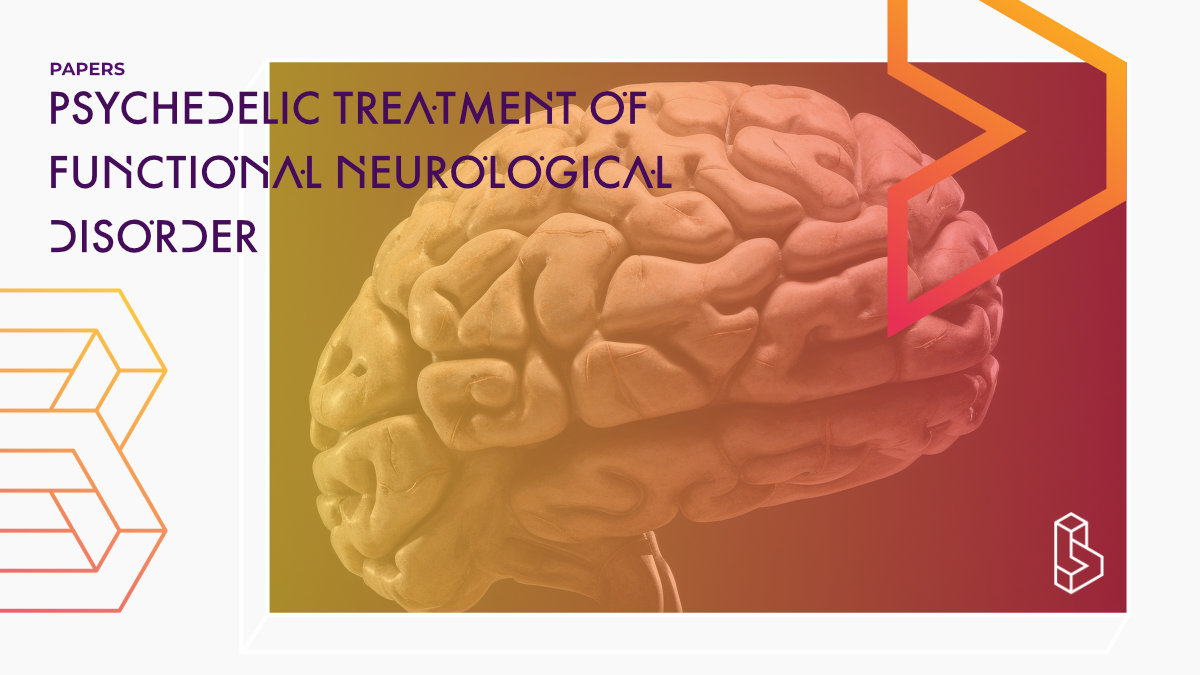This systematic review (2020) identified 9 studies (n=26) that investigated psychedelics for functional neurological disorder (FND; conversion disorder). Of the participants, treated in the 1960s, 69% showed some improvements with mild and transient adverse events.
Abstract of Psychedelic treatment of functional neurological disorder
“Functional neurological disorder (FND), formerly known as conversion disorder, causes a high burden of disability and distress, and is amongst the most commonly encountered conditions in neurology clinics and neuropsychiatric services, yet the therapeutic evidence base is somewhat limited. There has been recent interest in the therapeutic potential of psychedelics such as psilocybin and lysergic acid diethylamide (LSD), and in recent studies psychedelics have shown promise in treating a range of neuropsychiatric conditions. Modification of neural circuits associated with self-representation is thought to underlie some of this effect, and as some contemporary theories of FND focus on aberrant somatic self-representation, psychedelics may therefore represent an unexplored treatment option for FND. We systematically reviewed studies involving the use of psychedelics in FND. Nine studies published between 1954 and 1967, with a total of 26 patients, were identified. Due to restriction of licencing of psychedelic drugs since this period, no modern studies were identified. In most cases, patients received a course of psychotherapy with variable adjunctive administration of psychedelics (in a combination known as ‘psycholytic therapy’), with protocols varying between studies. Of those treated, 69% (n = 18) were found to have made at least some recovery on heterogeneous and subjective clinician-rated criteria. Adverse events were mostly mild and transient; however, at least one patient terminated the study due to distressing effects. All included studies were of low quality, often lacking control groups and valid outcome measures. Although no conclusions on efficacy may be drawn from these data, further research may help to determine whether psychedelics offer a feasible, safe and effective treatment for FND.“
Authors: Matthew Butler, Mathieu Seynaeve, Timothy R. Nicholson, Susannah Pick, Richard A. Kanaan, Andrew Lees, Allan H. Young & James Rucker
Notes on Psychedelic treatment of functional neurological disorder
Functional neurological disorder (FND) is when patients experience weakness, blackouts, and other sensory symptoms and movement disorders. The mind/brain perceives dysfunction in the body where, in actuality, the motor and sensory pathways are intact. The brains of patients (50 per 100,000) with FND were thought to be no different from average, but newer studies have shown this to be false.
Currently, there are no suitable treatments for FND.
Some studies in the 1950-60s investigated the use of psychedelics for FND and showed some positive effects. This review looks at 26 patients from 9 studies from that time. Noted should be that all the studies were of low quality (unclear selection criteria, other causes of effects not ruled out, unable to replicate study; see Table 1).
- 25 participants* received LSD (25-2000! μg, or unknown quantity)
- 11 participants received psilocybin (3-30mg (converted from IM, or unknown quantity)
- 6 participants received mescaline (unknown quantity)
*some trials used multiple compounds (and one trial with all three psychedelics didn’t report if all participants had received all three compounds)
“Of the 26 patients described with FND, 69% (n = 18) were found to have made at least some recovery, with 23% (n = 6) having recovered completely. The study authors were mixed in their recommendations for psychedelic therapy in patients with FND.“
Based on the limited data, no distinction could be made between psycholytic (low-medium dose of psychedelics) and psychedelic (high dose) therapies.
The authors argue that the alteration of the neural representation of the somatic (body) self may be the cause of FND. Psychedelics also influence the (overactive) brain areas that underpin FND. Where with FND, there may be too much top-down control, psychedelics flip this around and allow/force more bottom-up processing.
Although there are many limitations, the authors cautiously encourage future research with psychedelics for FND.
Summary of Psychedelic treatment of functional neurological disorder
Despite numerous treatments, successful evidence-based treatment options for FND remain elusive. Psychological therapy is one of the current mainstays of treatment, with promising evidence for cognitive-behavioural therapy.
In this article, the authors describe a systematic review of the literature describing psychedelic treatment in patients with functional neurological disorders. They conclude that further clinical research of psychedelic therapy for patients with functional neurological disorders should be considered.
Find this paper
Psychedelic treatment of functional neurological disorder: a systematic review
https://doi.org/10.1177%2F2045125320912125
Open Access | Google Scholar | Backup | 🕊
Study details
Participants
26

